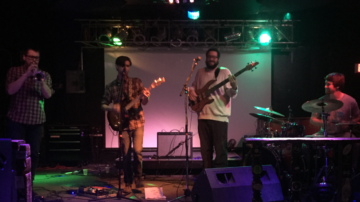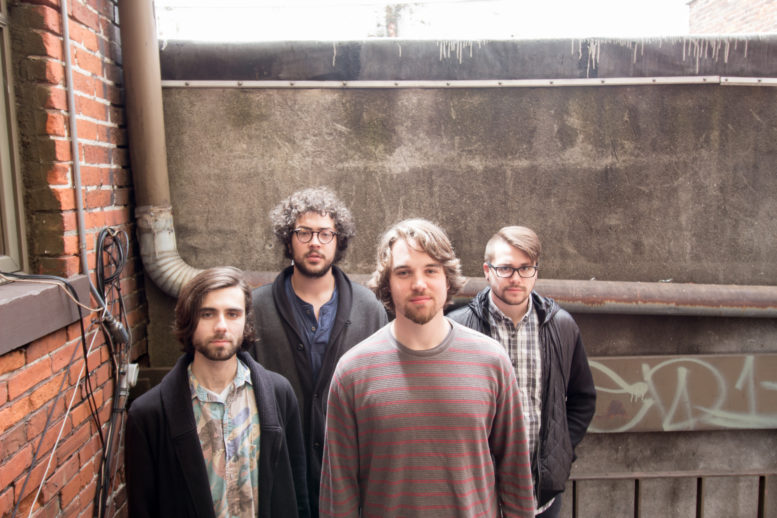By DAVID DUPONT
BG Independent News
The band Indian Opinion is all about harmony.
The jazz-influenced ensemble jams over the chords of its original songs. What really holds the band together though is the harmony of friendship.
Since its creation in 2015, Indian Opinion has been a staple of the local music scene with gigs at Grumpy Dave’s and especially at Howard’s Club H. “That’s our home court,” said Benji Katz, bass player, vocalist and songwriter in the group. Indian Opinion also includes Mark Dylan, guitar and vocals, JP Stebal, drums, and Connor Mancini, trumpet.
They’ll be back at Howard’s for the Saturday, March 25, Battle of the Bands.
They have set of songs available for download online featuring a set earlier this year from the club. (https://indianopinion.bandcamp.com/album/live-at-howards-121016-2) Now the band is in the process of producing its first full studio album.
The band is deeply rooted in the local scene, bridging the campus with the community.
It traces its roots back to 2015 when Connor and Stebal started jamming at Stebal’s house.
They knew each other as fellow music students, including singing in the Vocal Jazz Ensemble.
Dylan knew Katz from living on the dorms and brought him in. “It was just a network of friends, mostly from the college of music,” Dylan said.
The band originally had a saxophonist Hiroki Kato and a percussionist Billy Gruber. Even as the band has settled into its four-piece configuration, the members are still a welcoming crew inviting musicians to join them on gigs and bringing Gruber and saxophonist Garrett Tanner into the studio for the forthcoming session.
Abigail Cloud, one of Katz’ mentors in the creative writing program, also joins the band as she did on the live at Howard’s session.
“It’s a communal thing,” Mancini said. They welcome other musicians to jam with them on the stand, even when playing an out of town show.
That’s true to the band’s jazz roots. “Jazz music connected us as a band, and the idea improvised music and jamming,” Dylan said, “
“It happened pretty organically,” Katz said. “We all have a distinct voice, and that’s allowed to shine through in all our playing. When you’re improvising your personality is going to bleed into the music.”
Each brings their own musical biography to the band’s sonic palette.
Katz comes from Cincinnati. At 12 he wanted to a start a band with his friends, but avoided the obvious instrument choices of guitar and drums. Instead he was attracted to the “big and clunky and powerful sound” of the electric bass. Paul McCartney’s melodic approach to bass was an early influence.
Early in high school, he started studying with a teacher who introduced to him to jazz. While he had considered studying music in college, he inspired to write poetry by Jim Morrison of The Doors. He ended up getting a Bachelor’s of Fine Arts in creative writing with an emphasis on poetry. He’s now pursuing a master’s degree in the program.
Music runs in Dylan’s family. His grandfather was a jazz saxophonist and his father a drummer. Growing up on Long Island in New York they could take the train into New York City to go to the clubs. “I grew up with art around me,” he said.
He started out influenced by Nirvana and Green Day. Then in middle school the band teacher invited him to join the jazz band. He fell in love with the music, switching teachers for one who knew jazz.
When it came time to select a college he choose BGSU where a couple family friends had attended. He liked that it was a place where he knew no one.
He graduated with a music education degree and now teaches in the Springfield schools.
Mancini also came from a family with heavy involvement in the arts. His mother played piano and his brother played clarinet. He started playing trumpet in fifth grade. “I just really liked to practice.”
Growing up in Cleveland he played in jazz band and marching band. His teacher had studied with jazz great Clark Terry and played in Mojo, a big band that played at The Brothers Lounge in Cleveland. Mancini got a chance to join the band when they needed a fourth trumpet.
He came to BGSU to study business, but realized he didn’t like it.
He now has a double major in music and pre-law through the Philosophy, Politics, Economics and Law program.
Mancini plays lead trumpet with the Jazz Lab Band I, where he’s worked with David Bixler and Jeff Halsey, and has delved deeper into improvisation with small jazz ensembles.
Stebal also hails from Cleveland where his grandfather was a jazz guitarist and his father played drums.
“I’ve always played the drum kit but never got serious until high school,” he said. “I grew up playing mostly rock, playing in rock camps.”
Then he came to BGSU and studied with the late Roger Schupp. “That’s when I really started to figure out jazz and understand it more.”
The band is structured so everyone has a hand in creating the songs.
Katz and Dylan are the principle songwriters.
“Someone comes up with the chunk of the structure,” Dylan said. “They have their vision then everyone has their own take. All our influences can shape one person’s idea.”
So Mancini will create the horn lines, and Stebal will fine tune the groove.
“We all trust each other,” Katz said. “We’re all good friends. We’re all comfortable sharing these ideas and trusting they won’t be bastardized.”
As they perform the songs live, the tunes go through further transformation, Mancini said. Something cooked up on stage becomes another part of the arrangement.
Recording is an effort to capture “that perfect take of a song,” Dylan said.
The band is recording at Stone’s Soup Recording Studio in Maumee. “They have top of the line equipment so we know we’ll get the best sound quality that’s true to our instruments and our individual sounds,” Dylan said.
Connor said that recorded version is what all subsequent live versions will grow from.
“It’s an audio time capsule,” Katz said.
That capsule reflects a time when the band is living together in a house on North Main Street, having left their previous abode because of noise complaints.
Dylan said he sees the band continuing to grow and change. “We didn’t get together to be a band,” he said. “We just got together to play music. I can see us 30 years down the road still jamming and look back at this and saying ‘we were such babies as players.’”
Further down the line, when they are in the 70s, Dylan speculated they will still be getting together for “avant garde jams.” For now, though, Indian Opinion will continue to rock around town to their own jazz-fueled beat.

